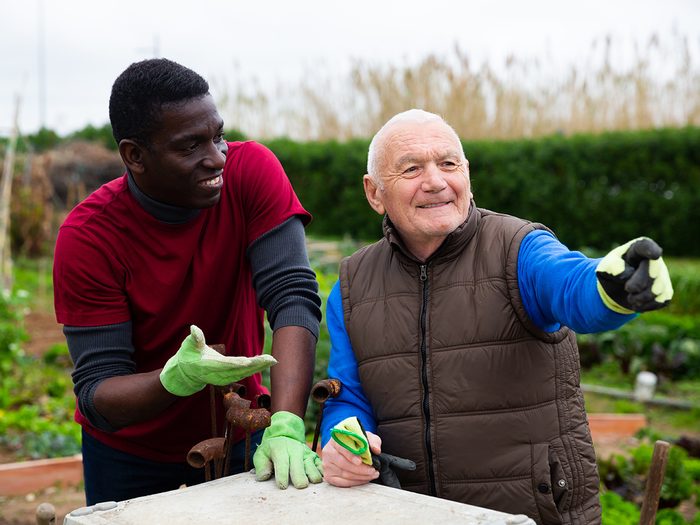
How to Speak Up for Yourself (and Others)
There’s a sinking sensation that happens when you’ve been silent in a situation where you wish you’d found the courage to speak up—whether it was standing up to a bully as a kid or keeping mum in a meeting while a peer railroaded an idea you worked on for months.
It seems like it should be easy to speak up, but when we’re faced with power imbalances or struggling to navigate bureaucracy, it can be challenging to summon an inner advocate. This conundrum often comes up in medical settings, where jargon-filled conversations and limited time with doctors can leave you feeling unheard.
Robin McGee experienced this first-hand. At 46, she was told her rectal bleeding was likely a reaction to an antibiotic she’d taken months prior for an infection. She wanted to believe her GP, but two years, three other doctors and many medical mistakes later, the clinical psychologist based in Port Williams, Nova Scotia, learned she actually had stage 3 colorectal cancer.
McGee’s experience is common for anyone eager to have their needs taken seriously by people in positions of authority. Her persistence meant she received treatment and went into remission for a time. She’s since written a book about the experience (The Cancer Olympics) and helps advise others who are navigating similar situations. Her tips may be useful if you’re struggling to speak up.

Be Your Own Best Advocate
McGee was armed with knowledge and had the confidence to question her doctors. But despite her escalating symptoms and family history of the disease, she was repeatedly dismissed.
If you’re worried about being heard, start by making sure you’re using all of your available resources. If you’re talking to a doctor, for instance, McGee suggests doing your homework: look up your symptoms online so you have a sense of the range of conditions that should be discussed.
If you’re struggling with an authority figure who doesn’t seem to take your concerns seriously when you do speak up, don’t be afraid to reach out to someone else for help. In a medical setting, that might mean asking for a second opinion, either by requesting a referral to a specialist or finding another practitioner. If you’re navigating roadblocks within a government agency, contacting an ombudsman—who investigates complaints—may help resolve the issue.
Finally, follow up: don’t hesitate to call a clinic to ensure your referrals have been sent and received or contact a case manager to inquire about the status of your financial-assistance application.
Is self-doubt holding you back? Here’s how to take control of those negative thoughts.

Look Out for Other People As They Age
It can also be tricky to speak up for someone else, especially if we don’t have a close relationship to the person who needs help. But it’s especially crucial to look out for people as they age. Phoebe Van Ham, a Chicago-area social worker and life coach for seniors, says older adults can find it tough to make demands: they may expect others to look out for their interests, or they may lack a support network as friends die or move away.
Mary M. Gilhooly, a professor in the department of clinical studies at Brunel University London, in England, has studied the financial abuse of elders and says there can be many reasons why people don’t intervene—a neighbour worrying she shouldn’t poke her nose into someone else’s business, for instance.
The key to a successful intervention is to make sure you have permission from the person affected, according to the Canadian Network for the Prevention of Elder Abuse. There may be a reason why someone hasn’t addressed a situation you may view as exploitative—an aging parent may realize they’re being taken advantage of but would rather live at home with their children than be put in a nursing home, for example.
Confronting the abuser should be avoided—they may take it out on the vulnerable party. While reporting abuse to the authorities might seem to make the most sense, other options, such as connecting the victim with a lawyer or social worker, may lead to more productive outcomes.
Find out how to rebuild self-esteem after your confidence has been shaken.

Remember That You Can Make a Difference
Agitating for change on a broader scale is a daunting prospect for many of us. “Dwelling on how helpless we feel toward larger problems is the greatest inhibitor to advocating,” says Ilana Landsberg-Lewis, the Toronto-based executive director of the Stephen Lewis Foundation.
Another barrier, she notes, is the idea that only a certain type of person can make a difference—that if we haven’t devoted our lives to activism, we’re powerless. “That isn’t true,” she says, “because it takes everyone’s talent, passion and individual contributions to create social change.”
Through her work at the United Nations and the charitable organization she established alongside her father in 2003, Landsberg-Lewis has supported grassroots organizations with issues like combating violence against women and stemming the spread of HIV/AIDS in Africa. She advises those who have never done advocacy work to find a cause that moves them and remember that everyone can speak up, and has something to contribute.
Samiya Abdi was moved to act in February 2017, when she learned that Somalia was on the brink of famine just six years after around 260,000 lives were lost during the last crisis. “I made a vow to myself—I’m not willing to see such devastation again,” the 35-year-old Torontonian says.
Abdi had never done fundraising, so she solicited help through Facebook. She connected with six young Canadian women of Somali descent, all of whom boasted specific skill sets—from fearlessly requesting donations to spreadsheet mastery.
In April, Abdi and her group, Fight the Famine, hosted an event in Toronto. In combination with their online campaign, it netted $30,000—and they’re still collecting. Since the event, the Canadian government has decided to match individual donations, meaning the group’s $30,000 contribution to Islamic Relief Canada will actually be worth $60,000.
At the end of the fundraiser, Abdi realized they’d be able to support emergency relief for 400 families for a month. She focuses on the impact that money will have, rather than getting overwhelmed by how many people are still at risk of losing their lives. “We need to continue,” she says. “This isn’t a sprint, it’s a marathon.”
Want to polish your speaking skills? Here’s expert advice on how to be more articulate.